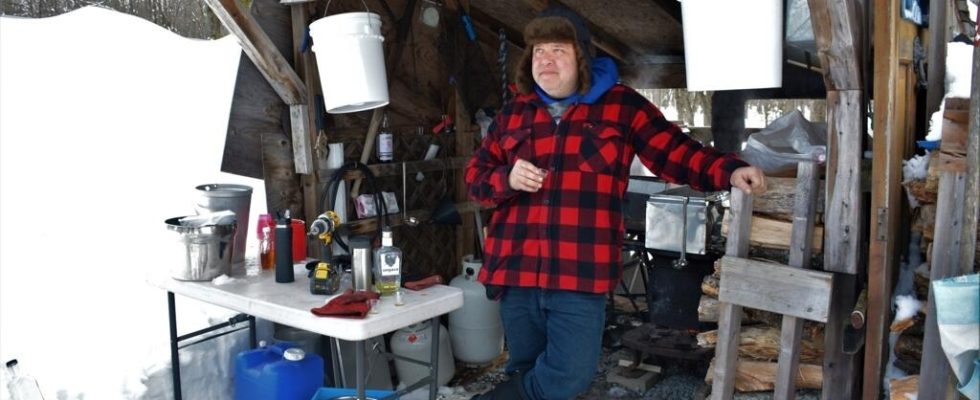In Quebec, the end of March marks the beginning of the sugar season, the three to four weeks when temperatures are hot enough during the day and freezing at night to cause the flow of maple sap. Far from being produced solely by industry, many Quebecers also make their maple syrup at home.
From our correspondent in Montreal,
When you ask Montrealers if they know any artisanal maple syrup producers, it’s often the same thing. A cousin, a sister, a friend produces it at home or at home, and it’s still the best maple syrup ever. Necessarily, when we take into account that the Canadian province concentrates 72% of the world production and that a large part of Quebecers have plots dotted with maple trees, the chances of knowing a small producer are immense, if not to be a self.
Many Quebecers got started during or after the coronavirus, and Facebook groups dedicated to craft production have grown. Eddy Filiatreault, administrator of a group that brings together more than 1,200 members, agreed to tell us about his passion: heading to Sainte-Anne-des-Lacs, an hour’s drive north of Montreal.
Passionate about sap
Chapka on his head, red checkered jacket, Eddy, 50, welcomes us to his home with a big smile. The month of March is coming to an end, it’s sugaring off time, it freezes at night, the sun heats the maple trees during the day, the ideal time to recover their sap. ” I took a week off to take care of sugaring. I could have gone south, as many of us do to escape the winter, but I like sugars too much, and my children would not want to miss it. laughs the Montreal firefighter.
On his immense land still covered in snow, behind his house, Eddy has apple trees, raspberries, hens, beehives – insulated for the winter – and maple trees. However, originally, it is not his universe: “ I come from the Montreal-North district, but I have always loved nature, skiing. Firefighter, I was able to develop passions on my days off, to see what the earth could give… but I’m not an agronomist “.
It was while falling at the counter of a grocery store on boilers, these metal vats to collect maple sap, that he said to himself why not, more than ten years ago. After this purchase, it was already too late to stop. ” I drilled four notches when I got home, I was wrong: two maples… and two poplars! But I continued the following year with 8, then 12 taps, then I bought equipment, a stove, and I never stopped explains Eddy.
Craft production
Eddy’s land has between 150 and 200 maple trees, but he only made about 30 taps this year, compared to more than 80 last year, to avoid overproducing. Quebecers have a deep respect for their trees: “ Every time you nick a maple, you injure it. I remove the blowtorch from the trunk and I make sure that it has healed well, and not to start again in the same place, so that the tree regenerates. » On an old maple tree, we can see a tap – the blowtorch – rusty, left by a former owner and surrounded by bark.
The manufacture of Eddy is completely organic, the municipality of Sainte-Anne-des-Lacs has banned pesticides from its territory. For several days, the maple sap is reduced in the little sugar shack he has made for himself. Passing from one basin to another, the water becomes loaded with sugar and turns into syrup. ” The hardest thing is to control the heat, so that the syrup does not exceed the desired sugar level mumbles Eddy as he stokes his fire.
In addition to the pride of having his own production, the firefighter does this above all for the conviviality that surrounds maple syrup: “ It encourages my children to go out, to collect the water with me, then I invite my colleagues from the barracks here at least once to meet around the syrup and go snowmobiling. “.
Strict rules
Like Eddy, thousands of Quebecers produce maple syrup at home. A practice viewed favorably by the organization of Producers of Quebec, which represents more than 13,300 professional maple syrup producers in the province. ” It’s something that is culturally very rooted and very strong: long before large-scale commercial production, there was family craft production, and that can create vocations explains Simon Doré-Ouellet, the assistant general manager. However, production is strictly supervised: an artisanal maple syrup producer cannot sell wholesale.
Eddy therefore offers his syrup and his honey to his family, his friends and via a website, scrupulously taking care not to sell in containers of more than five liters. Anyway, his production is not really priced. ” If I really counted the time I spend there, the bottle would be way too expensive “, he admits. For him, this is not the most important: he intends to continue to take care of his maple trees so that ” in forty, or fifty years, my children will be able to benefit from it, as I benefit from it today “.
